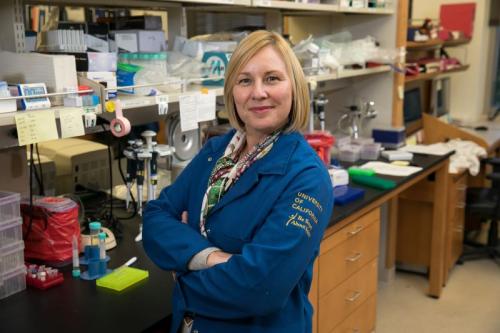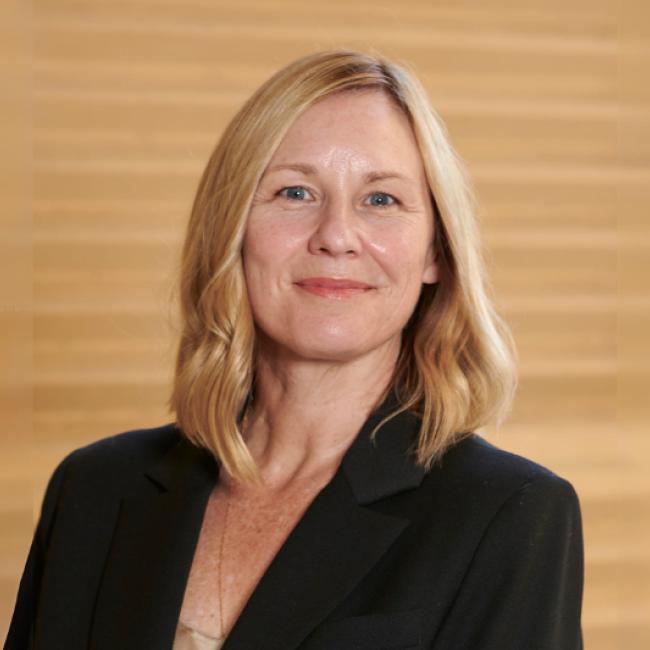
Faculty Profile: Amander Clark, Ph.D.
A member of the UCLA Broad Stem Cell Research Center and associate professor of molecular cell and developmental biology, Dr. Clark has built a career at UCLA as a prominent scientist studying the development of egg and sperm cells from germ cells to address three main areas of human health: the creation of new tools to identify and treat infertility, the process of tumor development in germ cells, and the causes of congenital abnormalities.
“My research is about understanding how eggs and sperm are made at the cell and molecular level and using that basic research to differentiate eggs and sperm from pluripotent stem cells,” Dr. Clark says. “Our research will help us understand causes behind human infertility that we can model in a dish. We also hope to understand how germ cell tumors such as testicular cancer develop, possibly leading to new treatments. Also my hope is that in the future we could use these cells as replacement cell types in particular for women who are infertile.”
Stem Cells, Fertility, Birth Defects, & Cancer
By using human stem cells to understand the fundamental events required to form germ cells, Dr. Clark sheds light on the early events in germ cell formation, and hopes to better understand the causes of infertility, birth defects, and how certain cancers form. To achieve her goals, Dr. Clark and her team recently developed the first method to map critical stages of human egg and sperm cell development during fetal life. The resulting map has important implications for research on infertility, such as for cancer survivors left unable to create eggs or sperm due to chemotherapy or radiation treatment. “If we can understand how things happen normally, we might be able to predict what happens when things don’t form normally,” she said.
Dr. Clark and her team also focus on understanding molecular events that transform normal cells into cancer cells. Her lab has a specific interest in germ cell cancers such as testicular cancer, which is believed to begin in males during fetal development. She and her lab also seek to understand and harness the power of embryonic stem cells to generate germ cells.
Leadership & Education
As director of the stem cell center's human embryonic stem cell (hESC) derivation lab, Dr. Clark is responsible for the creation of the UCLA hESC lines used widely in campus research. These lines are listed in the NIH Stem Cell Registry, illustrating the high legal and ethical bar achieved by Dr. Clark and the Center’s laboratory, and allowing the use of the hESC in federal research grants.
Dr. Clark values the opportunity to train the next generation of scientists in stem cell research. “I see this as a very important obligation of being in an academic institution. My lab is only 6 years old, and because some of these experiments take a great deal of time, I feel my research is just starting to blossom. Along the way I have had students who are very motivated and very clever, and they've had very creative ideas to help our research.”
Melbourne to Los Angeles
Dr. Clark and her fraternal twin sister were the first children born to her parents, sheep farmers from a small town four hours west of Melbourne, Victoria, Australia. Her parents were adamant that Clark attend university. Having seen biology in action growing up on the farm, she was also encouraged by her high school science teacher to make a career as a biologist. She received her Bachelor of Science and doctorate degrees in Anatomy and Cell Biology from University of Melbourne. In 1998, she moved to Texas as a post-doctoral scholar in a lab at Baylor College of Medicine, where she became interested in embryonic development and reproduction. Her desire to understand human development led her from Texas to a lab at the University of California, San Francisco in 2002, where she conducted research with human embryonic stem cells. For the next four years, she studied development of human germ cells in a quest to better understand human reproductive health. In 2006, Dr. Clark moved to Los Angeles to join UCLA’s faculty. She was among the first faculty recruited by the newly formed stem cell center. Dr. Clark was drawn to UCLA by the opportunity to be a part of building the stem cell center from the beginning and her personal and scientific contributions have had an immeasurable impact on the center’s success.
Looking to the future
Dr. Clark can envision a time when physicians will be able to use stem cells as a pathway to treat infertility in cancer patients. “A wonderful thing about cancer treatment right now is that we have many cancer survivors, but one of the side effects of chemotherapy in women is loss of eggs.” she says. For instance, fifty percent of women who survive breast cancer will end up infertile as a result of treatment. Her ever growing knowledge and technology could help cancer survivors who hope to start or grow their families.
The knowledge gained by Dr. Clark through her research has implications beyond infertility and cancer and could be applied to the treatments of any number of illnesses. She and her colleagues strive to apply their insights to make higher quality stem cells, improve methods for differentiating stem cells into daughter cells such as gametes, and understand the mechanics of infertility. In this way she hopes to bring stem cell research from the laboratory directly to the clinic.
